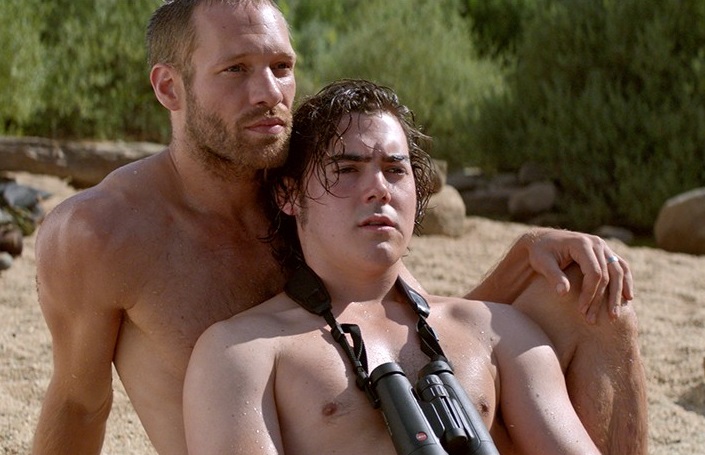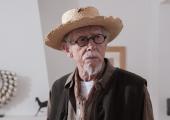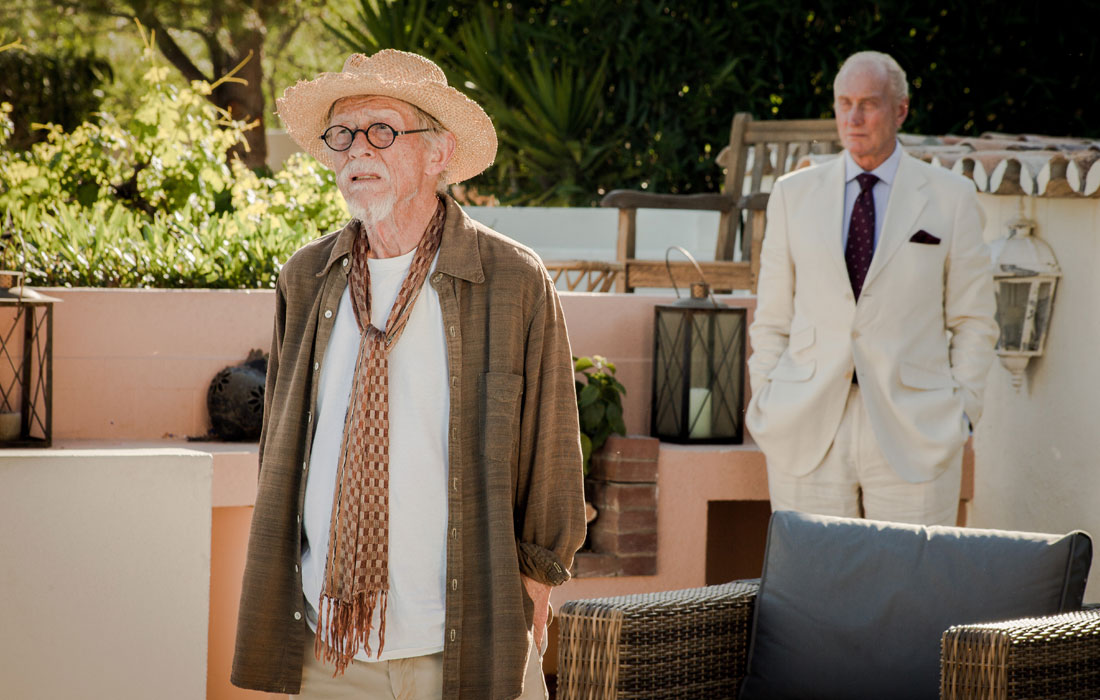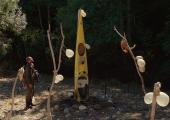While bird-lovers will certainly not be disappointed by Portuguese auteur João Pedro Rodrigues’ new film, the ambitions of The Ornithologist stretch considerably beyond such avine fascinations. Its opening title, “Whoever approaches the Spirit will feel its warmth, hence his heart will be lifted up to new heights,” ascribed to St Anthony of Padua, hints at a distinctly sacred element, and in fact Rodrigues’ film is (very) loosely based on the life of that saint, the patron both of the director’s native Lisbon and of the lost, another theme that becomes central to his film.
That is not, however, our first impression of the film’s protagonist Fernando (played by French actor Paul Hamy) as he methodically prepares for a day’s bird-watching in an isolated nature reserve, its remoteness defined by the unreliability of any mobile signal; Fernando ignores messages that come through from his presumed partner, who is concerned about his welfare and, in particular, whether he’s taking his medication. Instead he’s determined to enjoy his solitude in this stunningly beautiful landscape, canoeing down the river through high gorges, observing the impressive variety of birds that wheel overhead; his interests clearly go beyond those of the amateur, and he records his observations into a tape-recorder (ornithology was a passionate interest of the director in his youth). But this absorption means that he fails to notice approaching rapids in the river, and the next thing we know his body is found by two Chinese girls who are hiking through the thick forest, obviously very lost indeed from their Santiago pilgrimage route. From here on the tone of Rodrigues’ film moves ineffably towards the bizarre and spiritually highly-strung: when Fernando wakes up next, he’s been trussed up with ropes, à la St Sebastian, by the pilgrims. Narrowly escaping that one, his attempts to find his way back to civilisation (whatever that might mean in such a context) seem doomed, every new encounter stranger than the last.
But this absorption means that he fails to notice approaching rapids in the river, and the next thing we know his body is found by two Chinese girls who are hiking through the thick forest, obviously very lost indeed from their Santiago pilgrimage route. From here on the tone of Rodrigues’ film moves ineffably towards the bizarre and spiritually highly-strung: when Fernando wakes up next, he’s been trussed up with ropes, à la St Sebastian, by the pilgrims. Narrowly escaping that one, his attempts to find his way back to civilisation (whatever that might mean in such a context) seem doomed, every new encounter stranger than the last.
Climbing cliffs and negotiating the rocky river bank, he finds that the wreckage of his canoe has become a kind of shrine (main picture), and witnesses strange night-time rituals that hint at a pagan world. (Knowing that these are being conducted in Mirandese, Portugal’s rare minority language, and that the multi-coloured rag vestments are part of the careto ritual may not sufficiently alleviate the viewer’s sense of bafflement.) An unexpectedly sexual tryst ensues with a deaf-mute goatherd (Xelo Cagiao, pictured above with Hamy), turning suddenly violent in a manner that would certainly have intrigued Derek Jarman.
Though Rodrigues himself may not be a believer in any usual sense, there is certainly a sacred quality to the conclusion of his film, which sees the director himself step into the role of his protagonist
But it’s when, around the 100-minute mark, Fernando is pursued by bare-breasted horseback Amazon warriors speaking Latin that The Ornithologist finally loses any semblance of connection to the world as we traditionally know it. The observation delivered at one point here, "There are certain things we shoudn't try to understand", has rarely rung truer. Though Rodrigues himself may not be a believer in any usual sense, there is certainly a sacred quality to the conclusion of his film, which sees the director himself step into the role of his protagonist, as Fernando becomes known as Antonio: the change of name mirrors that of the life of St Anthony, and for those still keeping up there are other episodes from the life of the saint that are referenced, including his talking to the fish.
It’s certainly weird, and rather wonderful. A sublime coda takes the protagonists, Chinese pilgrims included, somewhere else altogether, that closure set to the magnificently secular anthem of Antonio Variacoes’ Canção de Engate; until that point the spare scoring has involved anxiously strangled string sounds from French cellist Séverine Ballon (development on The Ornithologist was slowed by Portugal’s financial crisis, and it became a coproduction with France). Cinematographer Rui Poças, known for his work with Miguel Gomes on Tabu and the wonderful Our Beloved Month of August, catches both the glories of the film's landscapes and the increasingly hallucinatory strangeness of its later action. (After all, we may wonder whether what we have been witnessing are psychotropic figments of Fernando’s imagination, brought on by his not taking his medication).
Rodrigues himself has described what he was aiming for in the film as a “Pasolini-type” Western, and in the sense that we follow an unusual journey that ends in a degree of enlightenment, it’s an allusion that is more helpful than confusing. The Ornithologist won Rodrigues the Best Director award at last year’s Locarno festival, and the film is quintessential festival fare: it certainly won’t win over all viewers – indeed, as a multiplex-emptier it would be unsurpassed – but for those who are persuaded, its eclectic fancy should exert an oblique fascination.
Overleaf: watch the trailer for The Ornithologist



 There’s at least one nice surprise in that interaction, which is more than can be said of most of the rest of the proceedings. Father-and-son interaction, along the lines of Michael’s accusation, “You were always generous with money, never with affection”, is distinctly formulaic, with Brown limited to playing foil to his father, the mere fact that they are still in contact at all something a surprise. Coupled with Styles’ casually loping directorial style, the female roles come across as little more than cyphers, Helin in particular displaying a blissed-out serenity that’s a million miles from the complexities of The Bridge. Barely a brow furrowed here, in fact.
There’s at least one nice surprise in that interaction, which is more than can be said of most of the rest of the proceedings. Father-and-son interaction, along the lines of Michael’s accusation, “You were always generous with money, never with affection”, is distinctly formulaic, with Brown limited to playing foil to his father, the mere fact that they are still in contact at all something a surprise. Coupled with Styles’ casually loping directorial style, the female roles come across as little more than cyphers, Helin in particular displaying a blissed-out serenity that’s a million miles from the complexities of The Bridge. Barely a brow furrowed here, in fact.


 But this absorption means that he fails to notice approaching rapids in the river, and the next thing we know his body is found by two Chinese girls who are hiking through the thick forest, obviously very lost indeed from their Santiago pilgrimage route. From here on the tone of Rodrigues’ film moves ineffably towards the bizarre and spiritually highly-strung: when Fernando wakes up next, he’s been trussed up with ropes, à la St Sebastian, by the pilgrims. Narrowly escaping that one, his attempts to find his way back to civilisation (whatever that might mean in such a context) seem doomed, every new encounter stranger than the last.
But this absorption means that he fails to notice approaching rapids in the river, and the next thing we know his body is found by two Chinese girls who are hiking through the thick forest, obviously very lost indeed from their Santiago pilgrimage route. From here on the tone of Rodrigues’ film moves ineffably towards the bizarre and spiritually highly-strung: when Fernando wakes up next, he’s been trussed up with ropes, à la St Sebastian, by the pilgrims. Narrowly escaping that one, his attempts to find his way back to civilisation (whatever that might mean in such a context) seem doomed, every new encounter stranger than the last.


